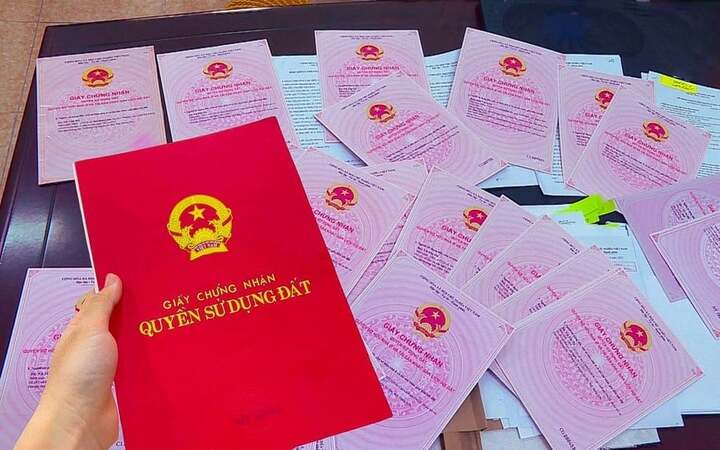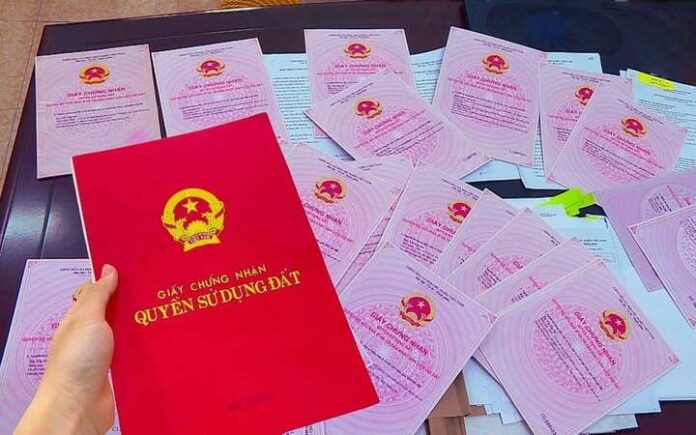In response to this query, the Ministry of Agriculture and Environment clarified that in cases of land registration, transfer, and mutation procedures involving changes to the address of the land lot, if the applicant wishes to carry out multiple procedures simultaneously, the responsible authorities are obliged to coordinate with the competent authorities to resolve the matter. This eliminates the need for applicants to go through each procedure individually.
Specifically, in a recent official dispatch to the People’s Committees of provinces and centrally-run cities, the Ministry of Agriculture and Environment emphasized that the rectification of land records, including cadastral maps, land registers, land books, and land-use right certificates, must be carried out simultaneously with the updating and rectification of local land data infrastructure.

Do citizens need to re-do their land-use right certificates after provincial mergers?
Land records and land data infrastructure that are currently being managed, archived, and operated will continue to be utilized to provide services to citizens and businesses.
The rectification of land records and land data due to administrative rearrangement must be carried out simultaneously with the resolution of administrative procedures related to land and assets attached to land. This ensures a smooth and unhindered process for citizens and businesses.
Notably, the official dispatch states that after administrative rearrangement, there is no mandatory requirement to simultaneously rectify previously issued certificates, unless there is a request from the land user or owner of assets attached to the land, or if it is carried out simultaneously with administrative procedures related to land.
The rectification of changes to land lot information (sheet number, lot number, address) on previously issued certificates shall be carried out in accordance with Clause 5, Article 41 of Circular No. 10/2024.
Specifically, Clause 5 stipulates that information about the address of assets attached to the land shall be presented as follows: the name of the work or name of the building (if any); house number, apartment number, alley, lane, street name (if any), name of the residential area, name of administrative units at the commune, district, and provincial levels.
The official dispatch clearly states that in cases where there is no blank line left on the issued certificate to confirm changes, a new certificate shall be issued to reflect the information of the land lot in accordance with Clause 6, Article 23 of Decree No. 101/2024.
Clause 6 stipulates the cases of registration of mutations of land-use rights and ownership of assets attached to land where there is no blank line left on the issued certificate to confirm changes, or where the land user or owner of assets attached to the land requests for a new certificate of land-use right and ownership of assets attached to land.
The text also states that the dossiers for the issuance of land-use right certificates, which were established by the district-level land management function, shall be handed over to the branch of the Land Registration Office immediately after the administrative rearrangement for archiving purposes.
As for the electronic land records that are being archived and operated within the land data infrastructure, the authorities shall continue to exploit and manage them to provide services to citizens and businesses in accordance with current regulations.
The New Red Book Rules: 4 Key Changes Effective July 1st That Every Homeowner Needs to Know
“Simplifying the Red Book Process: Unraveling the Four New Regulations Effective from July 1st.
As we approach the implementation date of new land regulations, it is crucial for citizens to understand the changes. These regulations, effective from July 1st, streamline the process of obtaining a Red Book, especially with the elimination of the district-level approval. Get informed and stay ahead to ensure a smooth and legal journey in the realm of land ownership.”
“From July 1st: Limiting Red Tape, Chairpersons of People’s Committees at the Commune Level are Now Able to Issue Land Use Right Certificates Within 3 Working Days”
Effective July 1st, the People’s Committee Chair at the communal level will be authorized to grant land-use right certificates and ownership of assets attached to the land to local residents. This new policy will significantly expedite the process, as the certificate issuance will now take no more than three working days.
Charging and Detaining Le Thanh Khoi
With a knack for deception, Le Thanh Khoi (born 1978, residing in Tan Hung, Ly Van Lam, Ca Mau city) fabricated information about secured assets and colluded in transferring land-use rights. This cunning individual deceived others out of their money, amassing a staggering 2.7 billion VND to fund personal expenses and debts.
No Disruption to Land Procedures During Trial Operations
On the morning of June 11, the atmosphere at the Gò Vấp District People’s Committee Office in Ho Chi Minh City was bustling yet efficient. Despite a steady stream of citizens seeking administrative services, the staff seamlessly processed their requests with remarkable speed. While some counters, such as those for business licenses, civil registry, and labor issues, swiftly dispatched their tasks within minutes, the land and property records counter experienced a slight delay in handling their documents.
Pursuing Prosecution for Ha Thanh Hang
Recently, the Investigative Police Agency of the Quang Ninh Provincial Public Security completed an investigation and proposed that the Quang Ninh Provincial People’s Procuracy prosecute Ha Thanh Hang (born in 1988 and residing in Vinhomes urban area, Hong Gai ward, Ha Long city, Quang Ninh province) for “Abuse of trust to appropriate property.”





















